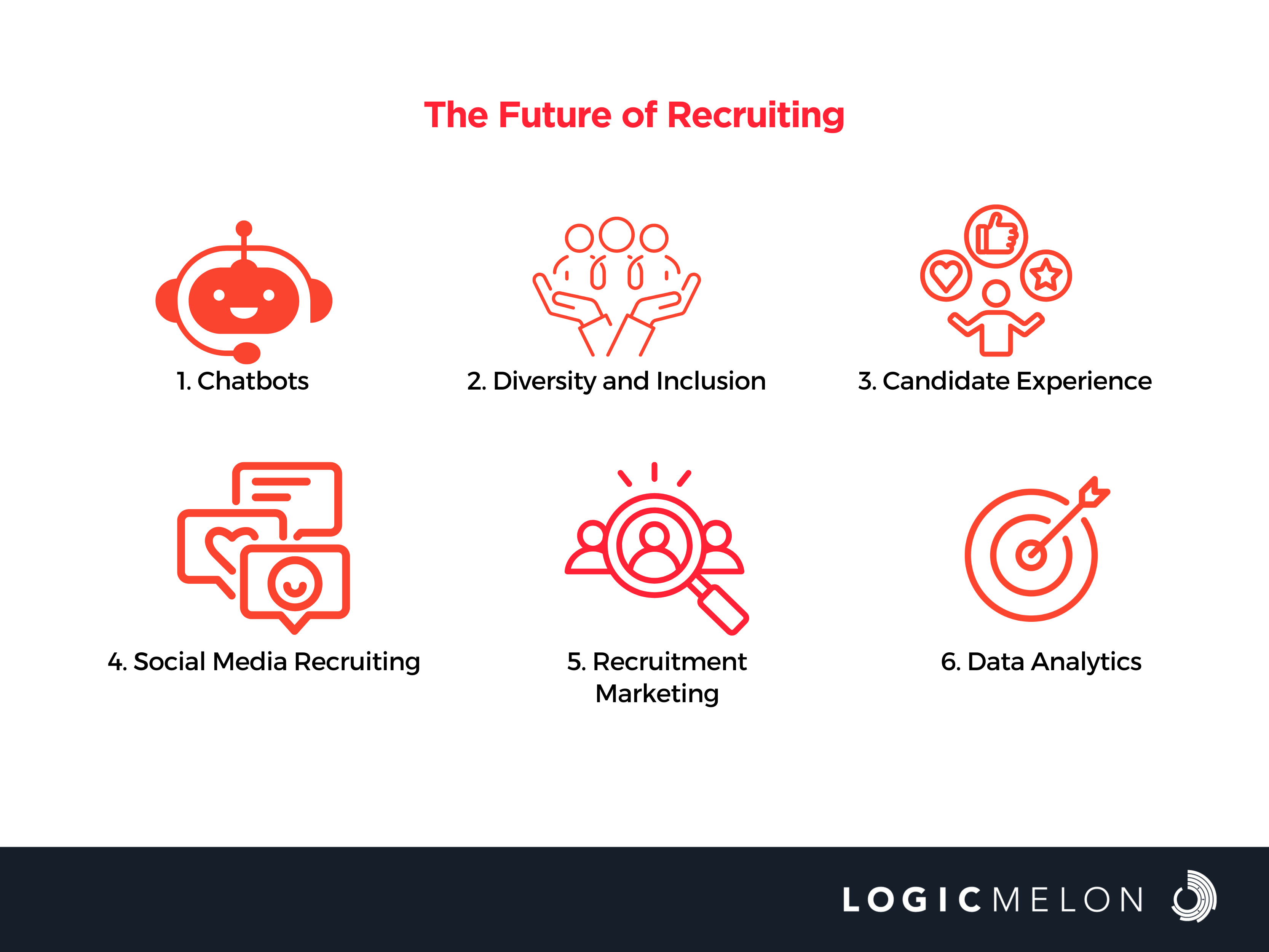The Future of Recruiting
Recruiting has always been a crucial aspect of any organisation. The rapid advancement of technology and the ever-changing business landscape have forced companies to adapt and embrace new technologies to fuel their growth. As the need for more recruiters and greater efficiency arises, it becomes essential to explore the possibilities and trends shaping the future of the recruitment industry. In this blog, we’ll take a fun and engaging journey into the exciting world of recruiting, keeping you updated on the latest trends and developments.

1. Chatbots: Your Friendly Hiring Assistants
Picture this: a recruiter’s dream comes true—chatbots! These intelligent assistants are revolutionising the recruitment industry by enhancing the candidate experience. Chatbots saw a 92% use increase since 2019, making it the brand communication channel with the largest growth. Designed to integrate seamlessly with Applicant Tracking Systems (ATS) and the technical stack, chatbots streamline the hiring process for both candidates and organisations. Acting as hiring assistants, they automate initial conversations and free up recruiters’ time for more meaningful interactions. With voice assistants becoming commonplace, recruiters can expect automation to play a significant role in the hiring process.
2. Diversity and Inclusion: Building Stronger Teams
In the quest for success, hiring managers now recognize the importance of building inclusive workplaces and diverse teams. Multicultural organisations have demonstrated increased levels of creativity, a deeper understanding of cultural differences, lower employee turnover, and greater opportunities for professional and personal development. To attract and retain top talent, companies must proactively adopt bias-free hiring practices and create inclusive job descriptions. By doing so, they gain a competitive advantage in the job market and foster a vibrant and diverse workforce.
3. Candidate Experience: The Key to Success
When it comes to the recruitment process, the candidate experience reigns supreme. It encompasses a candidate’s attitude, behaviour, and feelings throughout the hiring journey. A positive candidate experience not only creates a favourable impression but also amplifies the employer’s brand. To craft a memorable candidate experience, recruiters must constantly evaluate their processes, identifying areas for improvement and celebrating their successes. By prioritising candidate experience, organisations can create lasting connections and attract top talent.
4. Social Media Recruiting: Expanding Horizons
As organisations search for the crème de la crème of talent in the job market, they are turning to social media recruiting. Leveraging the power of social media marketing, companies can cast a wider net to attract the best applicants. Social media platforms serve as powerful tools to reach people with the right skills and qualifications, expanding the talent pool significantly. Moreover, social media engagement helps tap into passive candidates who may be open to new opportunities, enriching the talent acquisition process for organisations seeking to fill open positions.
5. Recruitment Marketing: Finding the Perfect Fit
Recruitment marketing plays a pivotal role in ensuring that organisations connect with the right candidates. It focuses on recruiting the ideal individuals for specific roles, helping companies fill vacancies effectively. By employing recruitment marketing strategies, recruiters can ensure that job advertisements reach their intended audience, fostering a positive relationship with potential candidates. This, in turn, enhances employer branding, increases brand awareness, and ultimately attracts top talent to the organisation.
6. Data Analytics: Unveiling the Insights
Data is the name of the game when it comes to making informed decisions. Recruiters armed with data analytics gain invaluable insights into highly qualified candidates, empowering them to make better hiring decisions. By leveraging data and predictive analytics, recruiters can expedite the hiring process, create a talent pool, and establish a permanent record of potential candidates or hires for future reference. Predictive analytics allows recruiters to use historical data to forecast future hiring activities, employing machine learning and modelling techniques to predict upcoming possibilities accurately.
Frequently Asked Questions
1. What is recruiting automation?
Recruiting automation involves automating the steps required to hire an employee, eliminating manual tasks and reducing human efforts. It covers the entire process, from identifying and acquiring potential candidates to engaging, pre-screening, interviewing, and ultimately hiring them.
2. How is AI transforming the recruitment industry?
Artificial intelligence (AI) is driving transformation in the recruitment industry by making the process more efficient and effective. AI-powered software can schedule interviews, pre-screen candidates, and answer job seekers’ questions, all without tiring or taking a break. It offers recruiters round-the-clock availability and support, revolutionising the way hiring is conducted.
3. What is a recruiting chatbot?
A recruiting chatbot is a software program that simulates human conversations during the recruitment process. Candidates engage with the chatbot, asking questions related to the hiring process. Chatbots initiate conversations by asking how they can assist and provide answers to frequently asked questions (FAQs). By engaging candidates and addressing their queries, chatbots significantly enhance the candidate experience.
Closing Thoughts: Embracing the Future of Recruitment
In our fast-paced and ever-evolving world, companies need a plan, a roadmap, and the courage to pursue their objectives. The future of recruitment lies in automation, as it enables organisations to provide an improved employee experience, attract and retain top talent, and thrive in a rapidly changing job market. To stay competitive, recruiters must embrace emerging trends in technology, remote work, diversity and inclusion, and soft skills. By paying attention to these recruitment trends, recruiters can gain a competitive edge in acquiring top talent, contributing to the success of their organisations. So, let’s welcome the future with open arms and unlock the full potential of recruitment in the exciting times ahead.
LogicMelon
Award-winning recruitment software that will find, attract, hire and analyse the way you want to work. At LogicMelon, we have experienced software recruitment marketing specialists to help you build effective recruitment solutions supported by the best customer service you’ll find anywhere!
Email: sales@logicmelon.com or call LogicMelon (UK) +44 (0) 203 553 3667 (USA) +1 860 269 3089
The Types of Employee Promotion
An employee promotion is a recognition of the person’s contribution towards the company. It plays a big role in employee satisfaction.
The Types of Employee Transfers
Developing an employee transfer strategy decreases the stress associated with work transfers. Read this article to know more.
What Is a Stress Interview?
Stress interview is the method of helping you find the candidates who can handle pressure and how they react in stressful situations.


